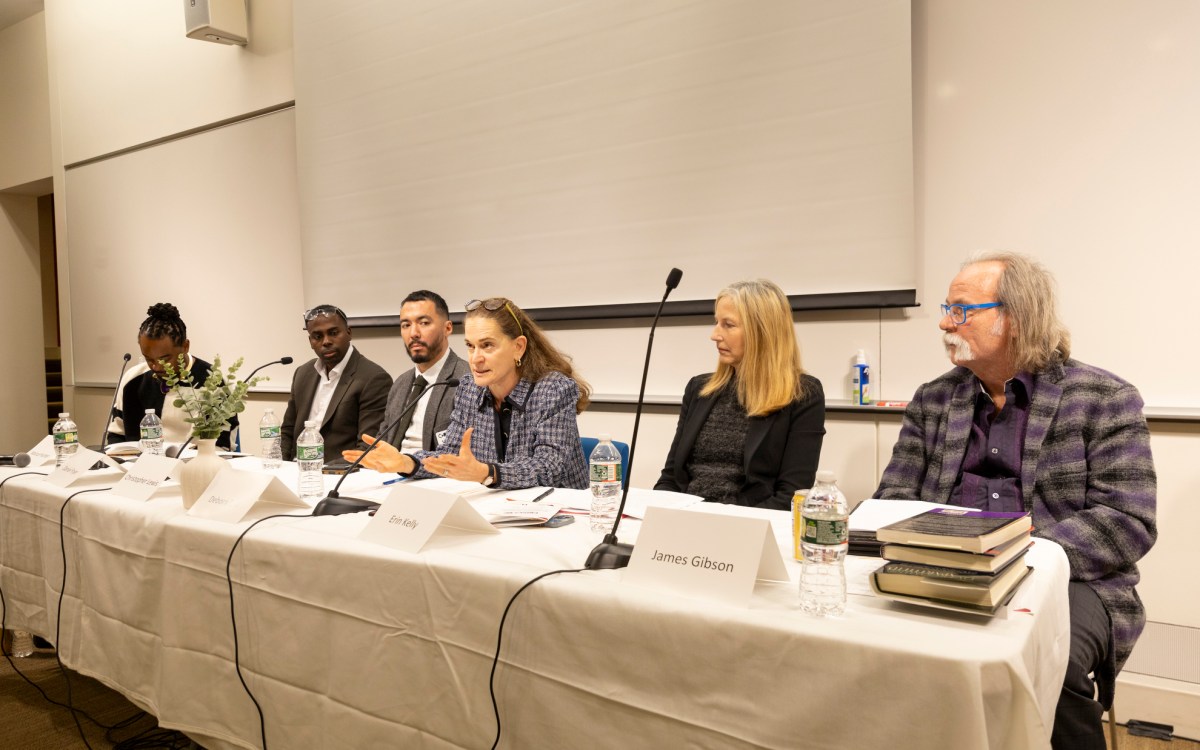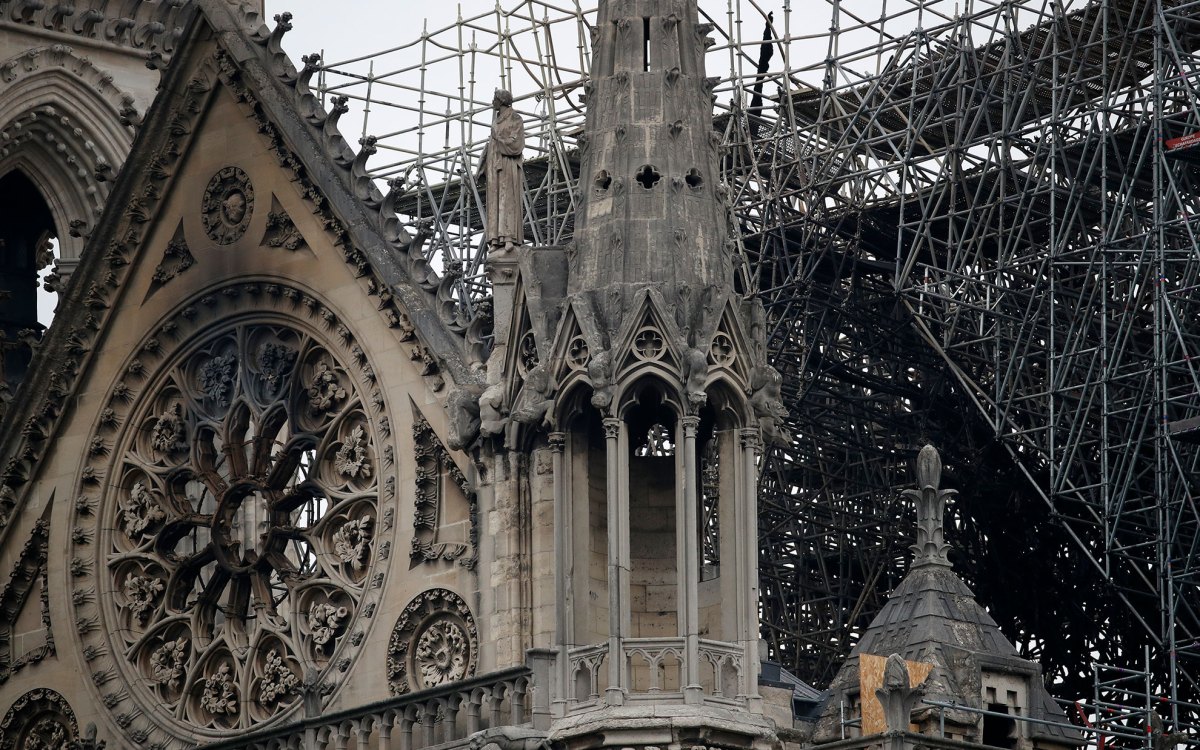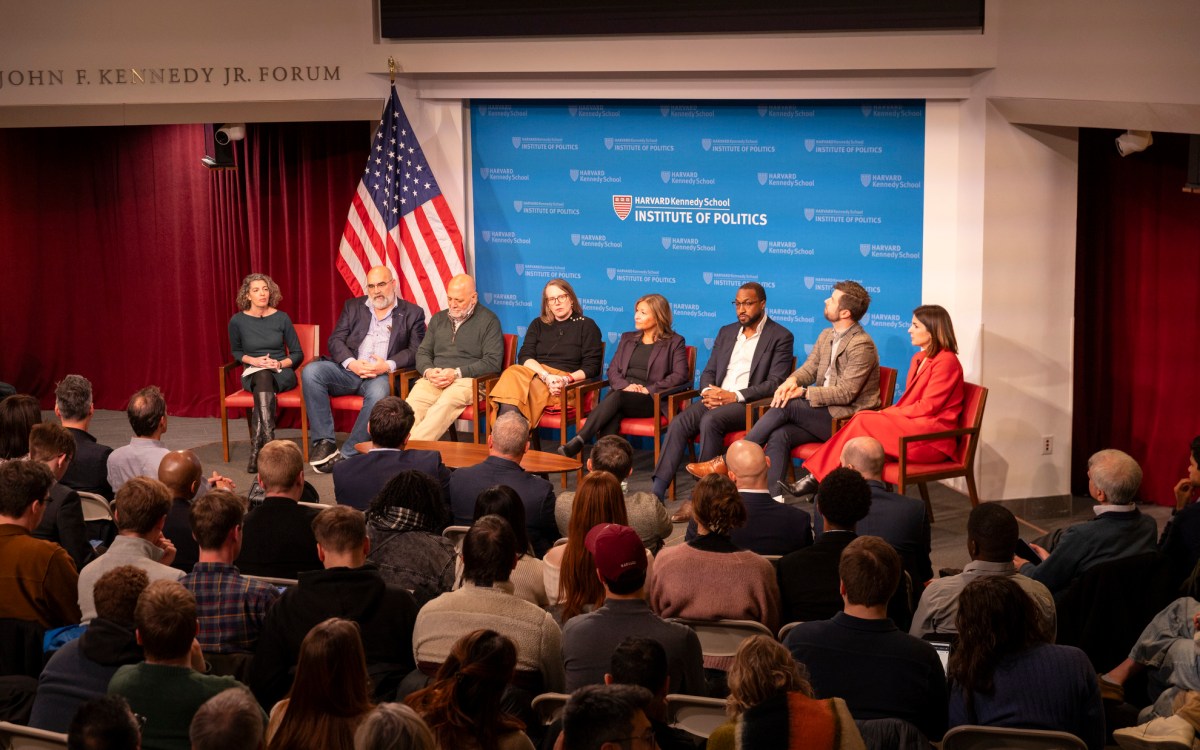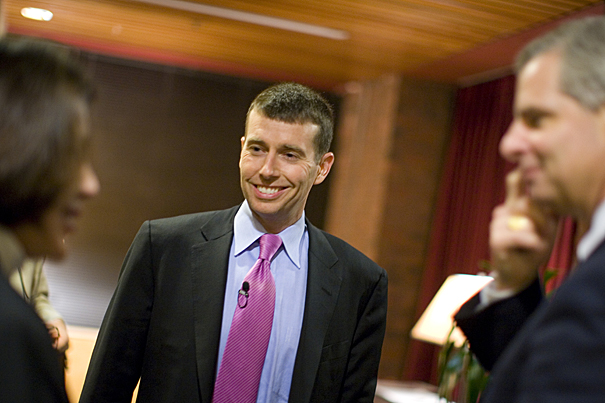Nation & World
-

Unfuzzy math: U.S. needs to do better
Ed School expert has some ideas, including a rethink of homework bans, after ‘discouraging’ results

-

What to expect when you’re elected
Bipartisan group of lawmakers gets to know Washington by way of the IOP
-

Defining and confronting campus antisemitism
Scholars in Jewish Studies say education, conversation can bolster efforts to defeat hate
-

Are reparations the answer?
Harvard symposium explores case for restitution to Black Americans legally, economically, ethically
-

Exact cause of Notre-Dame fire still unclear. But disaster perhaps could’ve been avoided.
Leadership expert says foreseeable factors all contributed to complex failure. Consistent focus needed on best practices, rules, procedures.

-

How the presidency was won, lost
Top campaign leaders from both sides talk about what worked, didn’t at Kennedy School postmortem
-
Health care
HEALTH CARE: Joseph Newhouse, John D. MacArthur Professor of Health Policy and Management, Harvard Kennedy School
-
Energy
ENERGY: Daniel P. Schrag, Sturgis Hooper Professor of Geology and Professor of Environmental Science and Engineering, Department of Earth and Planetary Sciences
-
Education reform
EDUCATION REFORM: Kathleen McCartney, Gerald S. Lesser Professorship in Early Childhood Development, dean, Harvard Graduate School of Education
-
Fiscal policy
FISCAL POLICY: Edward Glaeser, Fred and Eleanor Glimp Professor of Economics, director Taubman Center for State and Local Government, director Rappaport Institute for Greater Boston
-
Obama’s first 100 days
On the occasion of President Obama’s 100th day in office, we asked several Harvard faculty members to consider the new administration’s early actions in their areas of expertise and offer some guidance about how the president could make a difference on issues ranging from the threat of nuclear terrorism to energy policy in the days to come.
-
Eastern Congo nexus for many conflicts
Unrest in the Democratic Republic of the Congo’s (DRC) eastern border region stems both from what the nation has and from what it lacks.
-
Local partners critical to HHI’s work
Denis Mukwege has his hands full. So do Justin Kabanga and Maria Bard. The three each have leadership roles in nonprofits engaged in meeting the needs of people caught up in the fighting along the Rwandan border in the Democratic Republic of the Congo (DRC).
-
Michael VanRooyen: Rebuilding places that peace abandoned
“When they put the gun in my mouth, I decided it wasn’t so ridiculous after all.”
-
LGBT conference on ‘Politics, Policy and Progress’ at HKS
On Friday (April 24) the Harvard Kennedy School (HKS) will host a conference titled “Politics, Policy, and Progress: Gay Rights as Human Rights.” Among the many guests in attendance will be Lance Black, the Oscar award-winning screenwriter for “Milk.” The event, beginning at 12:30 p.m., will take place at the Kennedy School, with panels in Littauer 130, Bell Hall, Starr Auditorium, and the JFK Jr. Forum.
-
Experts talk about reducing crime through a holistic approach
Los Angeles is a city that many equate with violent gangs and an ineffectual and troubled police force. Yet recent years have seen a decline in gang homicides and violent crime due to a new approach in policing.
-
Strategist behind Obama campaign talks tactics at HKS
The architect behind Barack Obama’s successful presidential run shared his insights at Harvard Kennedy School on the strategies that propelled a first-term senator to the White House.

-
Interdisciplinary program on leadership hosts a host of fellows
Susan Leal intends to use her public sector expertise to address issues of water management and climate change. Former astronaut Charles F. Bolden Jr. is passionate about health care. Robert Whelan will likely turn his business acumen toward education.
-
‘What Just Happened? What’s Next?’
You might think of the little bits of good news that came out last week as the macroeconomic equivalent of the first crocuses of spring. There was the heartening word that initial jobless claims are slowing.
-
Petraeus addresses John F. Kennedy Jr. Forum
Gen. David H. Petraeus, chief of the United States Central Command, spoke at Harvard April 21, offering his perspective on leadership and lessons learned in Iraq, and his take on the United States’ strategy for the future security of Afghanistan and Pakistan.
-
Jocelyn Kelly: Seeking the whole picture of Congo violence
Jocelyn Kelly stood alone at the airport in Rwanda’s capital city of Kigali, wondering whether anyone would meet her.
-
Jennifer Scott: Being there for atrocity’s survivors
Jennifer Scott worked hard to become a doctor. But when she faced the ills of women in the Democratic Republic of the Congo, she realized her technical skills weren’t enough.
-
Harvard Kennedy School professors named 2009 Carnegie Scholars
Associate Professor Asim Ijaz Khwaja and Assistant Professor Tarek Masoud of Harvard’s John F. Kennedy School of Government (HKS) have been named 2009 Carnegie Scholars by the Carnegie Corporation of New York. The honorees were selected for their compelling ideas and commitment to enriching the quality of the public dialogue on Islam.
-
Congo: Just here suffering
Imani was just 15 when soldiers from the rebel group Interahamwe found her on the road in a remote region in the eastern Democratic Republic of the Congo (DRC).
-
Congo: Survivors sing of brutality and hope
The eastern DRC is swept up in a maelstrom of violence against women that has swirled for more than a decade. Researchers and physicians from Harvard and its affiliated hospitals are providing critical care for women fractured by their experiences.
-
-
Congo: The facts of gender violence
Researchers from the Harvard Humanitarian Initiative are working to understand the volume and impact of gender violence by analyzing data provided by survivors.
-
Congo: Panzi-HHI partnership
Harvard’s partnership with a Congolese hospital seeks to understand the causes of the violence against women that hangs like a toxic cloud over a huge swath of this enormous country in Africa’s midsection.
-
Despite years of study, schools’ success matter of contention
There wasn’t an empty seat in Askwith Hall Wednesday night (April 1) as students, educators, and researchers crowded in to hear “Informing the Debate: A Panel Discussion on Boston’s Charter, Pilot, and Traditional Schools,” sponsored by the Harvard Graduate School of Education (HGSE), the Rappaport Institute, and the Center for Education Policy Research.
-
HLS students help at-risk children to succeed in school
A witness to terrible domestic violence until the age of 8, “Jamal” still carries his worries into the classroom every day. Even though he and his mother are now safe, he’s unable to focus, frequently acts out, and has been suspended from third grade.
-
Harvard University Library awarded $5M grant from Arcadia Fund
Britain’s Arcadia Fund has awarded $5 million to the Harvard University Library. Arcadia’s five-year grant will provide flexible support for the library’s core functions: acquisitions, access, preservation, and dissemination.
-
The pogrom that transformed 20th century Jewry
On April 8, 1903 — Easter Sunday — a mild disturbance against local Jews rattled Kishinev, a sleepy city on the southwestern border of imperial Russia.
-
International Education Program fetes 10th anniversary
A politician intends to revolutionize the educational system in Kenya. A husband-and-wife team offers professional development to teachers to reduce social violence, develop civic competencies, and help eradicate poverty in Mexico. A student hopes to work on international educational reform.
-
Scholar enjoys wrestling ‘the Great Bear’
Some scholars are hard-pressed to identify what exactly drew them to their field. Others can point to a specific “aha!” moment when they found their academic calling. In Justin Weir’s case, it all began with a bit of bureaucracy.
-
Frank calls for (re) regulation
U.S. Rep. Barney Frank (D-Mass.), chairman of the House Financial Services Committee, came to the Harvard Kennedy School (HKS) Monday (April 6) to lay out a four-point program for re-regulating the nation’s financial system.
-
Cinematic reverberations
The writing of culture watcher and critic Louis Menand — Harvard’s Anne T. and Robert M. Bass Professor of English — has cast a wide net over the years.

